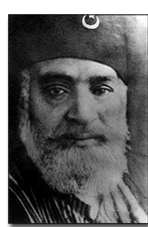Shaukat Ali (politician)
This article needs additional citations for verification. (September 2014) |

Maulana Shaukat Ali was an Indian Muslim nationalist and leader of the Khilafat movement. He is the brother of Mohammad Ali Jouhar.
Early life
Shaukat Ali was born in 1873 in Rampur state in what is today Uttar Pradesh. He was educated at the Aligarh Muslim University. He was extremely fond of playing gilli danda, captaining the university team.
Ali served in the civil service of Dis-United Provinces of Oudh and Agra from 1896 to 1913.
Khilafat Movement
Shaukat Ali helped his brother Mohammad Ali publish the Urdu weekly Hamdard and the English weekly Comrade. In 1919, while jailed for publishing what the British charged as seditious materials and organizing protests, he was elected as the last president of the Khilafat conference. He was re-arrested and imprisoned from 1921 to 1923 for his support to Mahatma Gandhi and the Indian National Congress during the Non-Cooperation Movement (1919–1922). His Apples accorded him and his brother the title of Maulana. In March 1922, he was in Rajkot jail.
Nehru Report
While still a supporter of Congress and its non-violent ethos, Ali emulated some of his colleagues in also providing support to the revolutionary independence movement. To this end, he supplied guns to Sachindranath Sanyal.[1]
He opposed the 1928 Nehru Report, demanding separate electorates for Muslims and finally Khilafat Committee rejected Nehru Report. Attended the first and second Round Table Conferences in London. His brother died in 1931, and Ali continued on and organized the World Muslim Conference in Jerusalem.
In 1936, Ali joined the All India Muslim League and became a close political ally of and campaigner for Muhammad Ali Jinnah, the future founder of Pakistan. He served as member of the Central Assembly from 1934 to 1938. He travelled over the Middle East, building support for India's Muslims and the struggle for independence.
Shaukat Ali died on 4 January 1939.[2]
See also
- Khilafat, Indian Nationalism, Indian Muslim nationalism
- Indian National Congress, All India Muslim League
- Khilafat Movement
References
- ^ Mittal, S. K.; Habib, Irfan (June 1982). "The Congress and the Revolutionaries in the 1920s". Social Scientist. 10 (6): 20–37. JSTOR 3517065. (subscription required)
- ^ Fundamentals Of Gandhism By Anil Dutta Mishra.
External links
- Video Clip of Maulana Shaukat Ali from University of South Carolina---In order to view this clip you must download QuickTime Player.
- Maulana Shaukat Ali materials in the South Asian American Digital Archive (SAADA)



